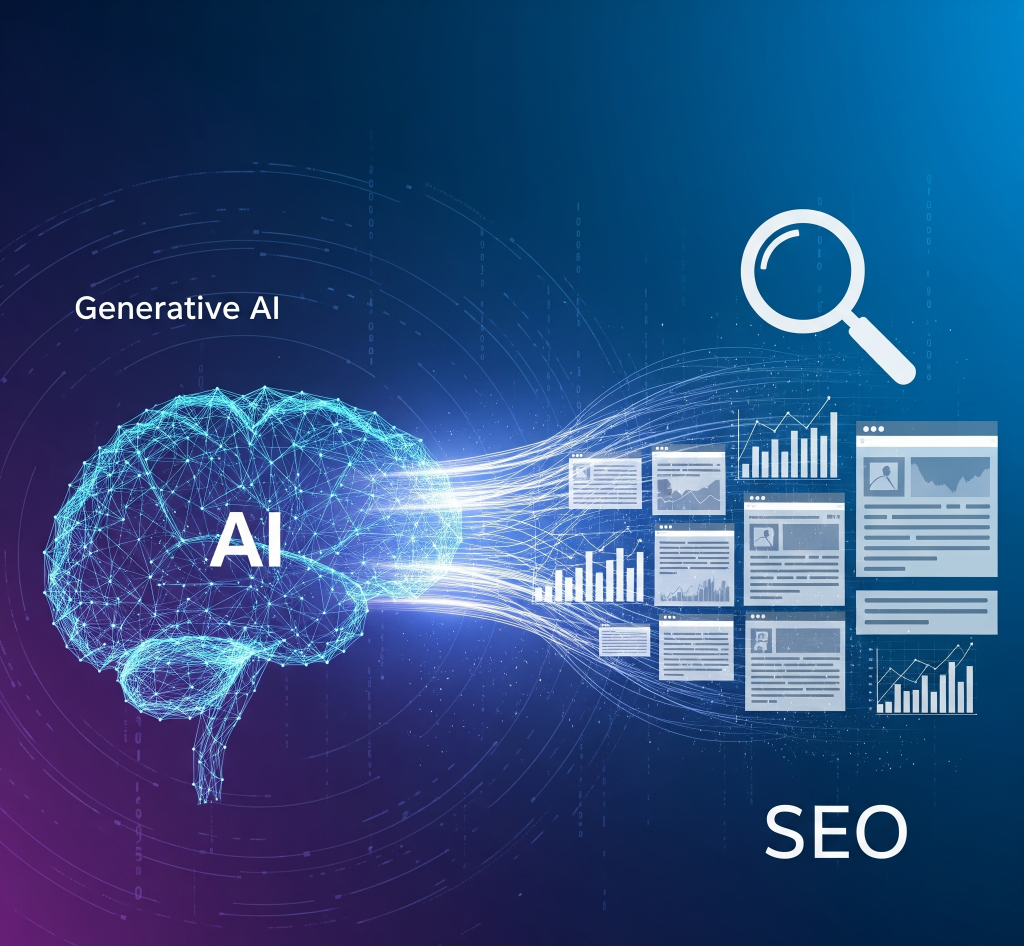Generative artificial intelligence (AI) has sparked many conversations, with some predicting the demise of Search Engine Optimisation (SEO). However, instead of being a threat, generative AI is opening up new and exciting avenues for SEO professionals. The landscape is shifting, and to stay ahead, content must be built for both humans and AI systems.
Content for the AI-Driven Web
The traditional SEO model, which prioritised manipulating technical signals and simple keyword density to rank a page high in a list of ‘ten blue links’, is rapidly evolving. Now, the ultimate goal is no longer just a high ranking; it’s to become an authoritative, definitive source that generative AI models—such as Google’s AI Overviews (or Search Generative Experience – SGE) and large language models like ChatGPT or Claude—can confidently draw from to synthesise accurate, complete, and trustworthy answers for users.
To achieve this coveted status as a preferred source for AI systems, your content needs to be demonstrably accurate, meticulously well-structured, and unequivocally trustworthy.
To be the source that AI systems prefer, consider these key elements:
- Factual Accuracy and Granularity: AI models operate by cross-referencing vast amounts of data. Generic claims will not suffice. Specific data points, verifiable statistics, unique examples, and transparent methodologies must back your content. This high level of granularity makes your information more ‘citable’ and defensible by an AI.
- Authority Signals (E-E-A-T): Content must demonstrate exceptional Experience, Expertise,Authoritativeness, and Trustworthiness (E-E-A-T), a concept long central to Google’s quality guidelines. This means clearly identifying the author (with a demonstrable background in the field), citing credible external sources, and linking to your own deep-dive research. Subject-matter expertise is now the ultimate ranking factor.
- Up-to-Date and Evergreen Information: AI Overviews favour fresh, recent data. Ensure your content is continually updated to reflect the latest statistics, insights, regulatory changes, or technological advancements. Furthermore, establishing a strong base of evergreen content—foundational articles that remain relevant over time—will solidify your site’s long-term value to AI models.
- Comprehensive and Unique Coverage: The AI-driven web values depth. Simply rewriting existing content offers no new value. You must add unique value by covering a topic in exhaustive detail, bringing a new perspective, sharing proprietary research, or providing actionable insights that cannot be found elsewhere. This depth is what distinguishes a mere publisher from a proper authority.

A New Action Plan for SEO
Instead of viewing AI as a competitor or a threat, forward-thinking SEOs should embrace it as a powerful partner and a new distribution channel. The focus shifts from tricking an algorithm to serving it with the highest quality, most digestible information.
Here’s a new, more detailed action plan to align your content strategy with the preferences of generative AI systems:
- Optimise for Retrieval, Not Just Keywords: Content must be structured for easy parsing and direct answer extraction by AI models. Use clear, descriptive subheadings (e.g., ‘What are the main causes of climate change?’) that mirror common user questions or search intents. Format key information with bullet points, numbered lists, tables, and short, conciseparagraphs to create ‘information blocks’ that AI can easily isolate and cite in its generated summaries.
- Ensure AI Bot Accessibility and Crawlability: It’s counterproductive to hide your most valuable content. Ensure your website is fully accessible to a variety of AI crawlers, including specific bots like GPTBot, ClaudeBot, and Google-Extended (the crawler for SGE). Regularly review your robots.txt file and actively avoid using ‘noindex’ or ‘nosnippet’ tags on any high-value, authoritative content you want AI to reference.
- Build Topic Clusters and Semantic Fields: Move beyond individual keyword targeting. Create interconnected topic clusters—a pillar page that comprehensively covers a broad subject, supported by numerous cluster pages that delve into specific sub-topics. This structure clearly demonstrates to both search engines and AI models that your site possesses deep, systematic expertise on a subject, establishing you as a go-to authority.
- Monitor AI Mentions and Citation: Traditional SEO tracking involved keyword ranking. The new frontier involves actively monitoring AI platforms for mentions of your brand, proprietary data, or unique insights. This consists in checking AI Overviews and interacting with LLMs, such as ChatGPT, to observe how they cite and refer to your content compared to your competitors. This feedback loop is crucial for understanding how you are being positioned in the AI-generated information space.
- Leverage AI for Content Ideation and Augmentation: Use AI tools not to write your content, but to enhance it. Utilise AI to identify content gaps, map out comprehensive topic structures, generate related questions a user might ask, and summarise complex academic papers for simpler consumption. This makes your content more exhaustive and valuable.

Ethical Content and Brand Integrity in the AI Era
As generative AI models increasingly summarise and synthesise information, content quality becomes inextricably linked to brand trust and ethical practice. The risk of being misinterpreted, decontextualised, or cited alongside misinformation is higher than ever, making proactive ethical SEO a necessity.
- Transparency in Source Attribution: While AI models may cite you, the user sees the summary first. It is paramount that your content clearly signals its source, authorship, and data provenance. For high-stakes content (e.g., medical, financial, legal), ensure authors are readily identifiable and qualifications are clear—this is a trust signal for both humans and AI.
- Mitigating Hallucination Risk: Generative AI is prone to ‘hallucinations’ (generating false information). SEOs must focus on eliminating ambiguity and using precise language and data points to ensure clarity and effectiveness. If your content is vague, the AI may fill in the blanks incorrectly and attribute the error to your site, damaging your brand integrity.
- Protecting Copyright and Originality: The rise of AI scraping means your unique, proprietary content is at risk of being ingested and regurgitated without appropriate credit. While optimising for crawlability is key, also be prepared to assert your digital rights. Future SEO strategies may involve employing technical measures to help AI understand the source and value of your content.
- Brand Sentiment Monitoring in AI Outputs: Beyond simple brand mentions, SEOs must monitor the context in which their brand is cited in AI summaries. A neutral mention is fine, but a citation in a negative context or one linked to factual errors requires swift, remedial action on the source content to protect the brand’s reputation as a reliable authority.
The role of the SEO professional has evolved into that of a Digital Authority Architect, balancing technical visibility with fundamental ethical responsibility. By adapting your strategy to work with AI systems, focusing on unparalleled authority and structured clarity, you can ensure your content not only survives but thrives in this dynamic new digital landscape.
Contact Our Experts For Digital Marketing Strategy
Get in touch with our team of Digital Marketing Strategy specialists, who possess the knowledge and expertise to fully optimise your social media and website, enabling you to increase the number of leads and conversions your business generates.
Call our team on 0121 439 5450, alternatively, fill out our contact form.
Categories
- Advertising (6)
- Artificial Intelligence (4)
- CMS (1)
- Content Marketing (9)
- Content Writing (4)
- Conversions (2)
- Digital Tips & Insights (31)
- Email Marketing (7)
- General (1)
- Google (39)
- Guides (7)
- Image (3)
- Industry News (7)
- Mobile Apps (1)
- Mobile Search (5)
- Odyssey New Media News (5)
- PPC (5)
- Product Listing Ads (1)
- Remarketing (2)
- Reviews (3)
- SEO (60)
- Backlink Analysis (6)
- Link Detox (2)
- Local SEO (1)
- SEO Basics (3)
- SEO Content Writing (3)
- SEO Ranking Factors (10)
- SEO Tips & Advice (18)
- Technical SEO (2)
- Social Media (52)
- Facebook (14)
- Instagram (9)
- Social Advertising (2)
- Social Analytics (1)
- Twitter (6)
- YouTube (8)
- Video (5)
- Video Conference (1)
- Web Design (9)
- Web Usability (2)



